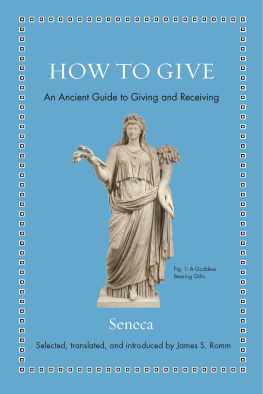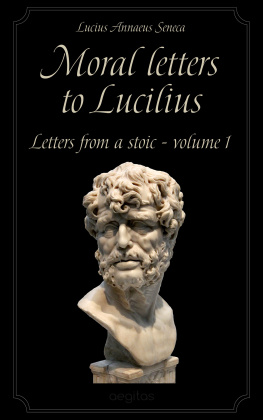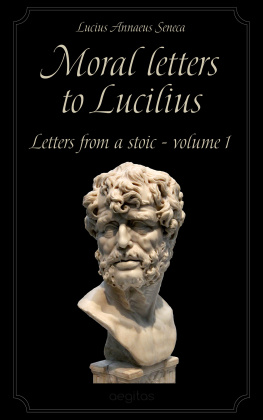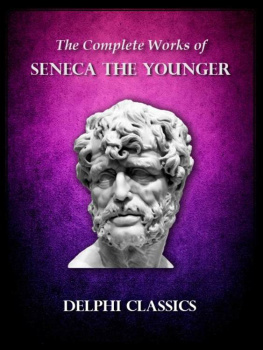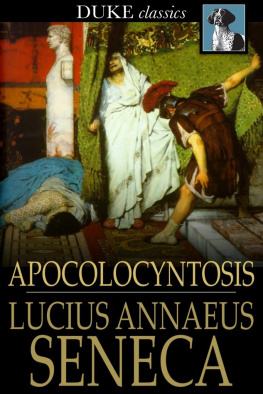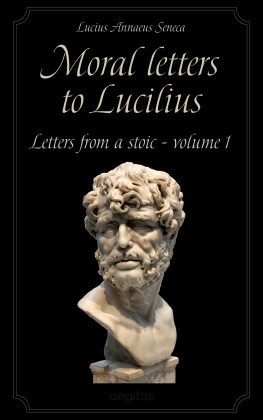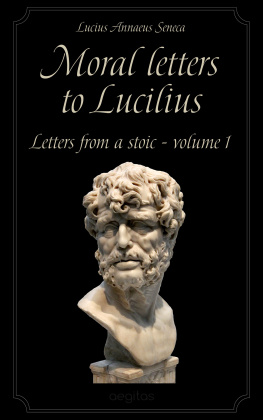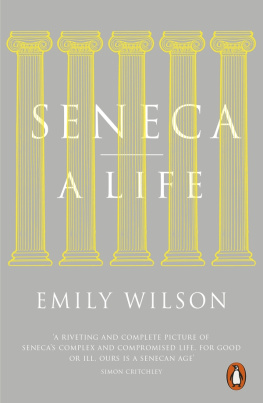Seneca - How to Give
Here you can read online Seneca - How to Give full text of the book (entire story) in english for free. Download pdf and epub, get meaning, cover and reviews about this ebook. year: 2020, publisher: Princeton University Press, genre: Romance novel. Description of the work, (preface) as well as reviews are available. Best literature library LitArk.com created for fans of good reading and offers a wide selection of genres:
Romance novel
Science fiction
Adventure
Detective
Science
History
Home and family
Prose
Art
Politics
Computer
Non-fiction
Religion
Business
Children
Humor
Choose a favorite category and find really read worthwhile books. Enjoy immersion in the world of imagination, feel the emotions of the characters or learn something new for yourself, make an fascinating discovery.
- Book:How to Give
- Author:
- Publisher:Princeton University Press
- Genre:
- Year:2020
- Rating:4 / 5
- Favourites:Add to favourites
- Your mark:
- 80
- 1
- 2
- 3
- 4
- 5
How to Give: summary, description and annotation
We offer to read an annotation, description, summary or preface (depends on what the author of the book "How to Give" wrote himself). If you haven't found the necessary information about the book — write in the comments, we will try to find it.
Seneca: author's other books
Who wrote How to Give? Find out the surname, the name of the author of the book and a list of all author's works by series.
How to Give — read online for free the complete book (whole text) full work
Below is the text of the book, divided by pages. System saving the place of the last page read, allows you to conveniently read the book "How to Give" online for free, without having to search again every time where you left off. Put a bookmark, and you can go to the page where you finished reading at any time.
Font size:
Interval:
Bookmark:

HOW TO GIVE
ANCIENT WISDOM FOR MODERN READERS

How to Give: An Ancient Guide to Giving and Receiving by Seneca
How to Drink: A Classical Guide to the Art of Imbibing by Vincent Obsopoeus
How to Be a Bad Emperor: An Ancient Guide to Truly Terrible Leaders by Suetonius
How to Be a Leader: An Ancient Guide to Wise Leadership by Plutarch
How to Think about God: An Ancient Guide for Believers and Nonbelievers by Marcus Tullius Cicero
How to Keep Your Cool: An Ancient Guide to Anger Management by Seneca
How to Think about War: An Ancient Guide to Foreign Policy by Thucydides
How to Be Free: An Ancient Guide to the Stoic Life by Epictetus
How to Be a Friend: An Ancient Guide to True Friendship by Marcus Tullius Cicero
How to Die: An Ancient Guide to the End of Life by Seneca
How to Win an Argument: An Ancient Guide to the Art of Persuasion by Marcus Tullius Cicero
How to Grow Old: Ancient Wisdom for the Second Half of Life by Marcus Tullius Cicero
How to Run a Country: An Ancient Guide for Modern Leaders by Marcus Tullius Cicero
HOW TO GIVE

An Ancient Guide to Giving and Receiving
Seneca
Selected, translated, and introduced
by James S. Romm
PRINCETON UNIVERSITY PRESS
PRINCETON AND OXFORD
Copyright 2020 by Princeton University Press
Requests for permission to reproduce material from this work should be sent to permissions@press.princeton.edu
The Latin texts for De Beneficiis are reprinted from The Latin Library, http://www.thelatinlibrary.com/about.html. The Latin text for Epistle 81 is reprinted from Epistles 6692, translated by Richard M. Gummere, Loeb Classical Library #76, Harvard University Press, 1920.
Published by Princeton University Press
41 William Street, Princeton, New Jersey 08540
6 Oxford Street, Woodstock, Oxfordshire OX20 1TR
press.princeton.edu
All Rights Reserved
Library of Congress Cataloging-in-Publication Data
Names: Seneca, Lucius Annaeus, approximately 4 B.C.-65 A.D., author. | Romm, James S., translator.
Title: How to give : an ancient guide to giving and receiving / Seneca ; selected, translated, and introduced by James S. Romm.
Other titles: De beneficiis. Selections English | An ancient guide to giving and receiving
Description: Princeton, New Jersey : Princeton University Press, 2020. | Includes bibliographical references and index.
Identifiers: LCCN 2020007754 (print) | LCCN 2020007755 (ebook) | ISBN 9780691192093 (acid-free paper) | ISBN 9780691211367 (ebook)
Subjects: LCSH: Conduct of lifeEarly works to 1800. | BenevolenceEarly works to 1800.
Classification: LCC BJ1550 .S4613 2020 (print) | LCC BJ1550 (ebook) | DDC 177/.7dc23
LC record available at https://lccn.loc.gov/2020007754
LC ebook record available at https://lccn.loc.gov/2020007755
British Library Cataloging-in-Publication Data is available
Editorial: Rob Tempio and Matt Rohal
Production Editorial: Sara Lerner
Text and Jacket Design: Pamela L. Schnitter
Jacket Credit: Empress Livia Drusilla, wife of Augustus, as Ceres, 38 BC. Marble sculpture, Roman. Photo: Herv Lewandowski / Muse du Louvre. RMN-Grand Palais / Art Resource, NY
CONTENTS
INTRODUCTION
When was the last time you gave someone a gift? Perhaps it was on an occasion when gifts are expecteda birthday, or wedding, or graduation. Or perhaps you gave spontaneously, out of the goodness of your heart, as the expression goes. Perhaps you treated a date to a meal, or brought a bottle of wine to a dinner party, or wrote a check to a charity or cause. Probably you did not stop to consider the moral meaning of your action, or fully appreciate the fact that, in the eyes of the Roman writer Seneca, you were, in some small way, saving the world. Your ability to give, as Seneca discussed in his treatise De Beneficiis, or On Benefits, is an essential part of what makes you human, and if your giving is done in the right spirit, it can even bring you close to the divine.
As a thinker of the Stoic school, Seneca saw a divine plan behind all human activity, especially the giving of gifts and doing of favors. His philosophy had strong underpinnings in religious belief. He speaks of a Guiding Principle, from which things take their form (1.6, on p. 23), though he sometimes imagines this as composed of a plurality of beings, or equates it with Nature or with the stars and planets. In the end, he claims at one point (4.7, pp. 13537), its not important what name we give to the first cause of all things, whether we make it singular or plural, or whether we personify it, so long as we strive to follow the inner promptings it has instilled in us. The impulse toward generosity, he maintainsthe goodness of our heartsis foremost among these.
How does the human race survive, Seneca asks, lacking the speed, strength, and ferocity of other animals? Only through our two unique attributes (4.18): Reason and what Seneca calls societas, the social impulse, here rendered Fellowship for want of a better translation. Our ability to help one another, to pool our resources, to give, has elevated us above the wild creatures that otherwise outstrip us, and indeed has made us masters of creation. (Seneca was not well versed enough in the natural world to spot a similar social impulse in other animals, and he knew little of the apes and monkeys that share this trait with human beings.)
In Senecas eyes, we did not develop these abilities over time, as a modern evolutionary biologist might claim. Our impulse toward generosity was hard-wired from the start. We are meant to be generous beings, just as we are meant to be virtuous in other ways, to employ reason to guide our actions, and to prevent virulent emotionsanger in particular, as well as fear, especially fear of deathfrom throwing our minds off course. These are core principles of the Stoic school, explored by Seneca in the many prose treatises and open letters he published throughout his life. (My two other volumes in the Ancient Wisdom for Modern Readers series, How to Keep Your Cool and How to Die, present Senecas thinking on the problem of disruptive emotionsanger in the first case, fear of death in the second.)
In the treatise excerpted here, De Beneficiis, or On Benefits, Seneca sought to strengthen the giving impulse and heighten our awareness of how much we gain by following it, and how much we lose by ignoring or perverting it. Selfishness, timidity, egoism, greed, and a dozen other failings, in Senecas view, get in the way of our divine natures. We decline to give, or we give badly, lording our gift over those who receive it, seeking renown for having given, or expecting something in exchange, a return for our giftin that case a gift no longer, but something more like a loan, bribe, or business transaction. On the other side of the gifting relationship, we often also get badly, without the sense of gratefulness that makes us want to be givers ourselves. Our ingratitude makes others less willing to give, and the binding ties of societas begin to fray.
On Benefits is the longest of Senecas extant essays, an indication of the importance he gave to its theme. He may well have added to it over time, for the last three of its seven books have a very different tenor than the first four, and the seventh book contains some off-topic material that feels like a later accretion. Even after completing it, he still had more to say on the subject, for he devoted one of his
Next pageFont size:
Interval:
Bookmark:
Similar books «How to Give»
Look at similar books to How to Give. We have selected literature similar in name and meaning in the hope of providing readers with more options to find new, interesting, not yet read works.
Discussion, reviews of the book How to Give and just readers' own opinions. Leave your comments, write what you think about the work, its meaning or the main characters. Specify what exactly you liked and what you didn't like, and why you think so.

